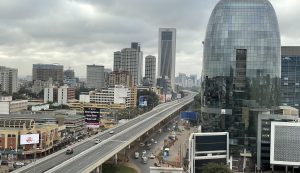HANS STOISSER
Mozambique – terrorism threat yes, civil war no
Maputo, 24.10.2013 – „Mozambique shall put at stake all its economic boom?“, my vis-à-visis asks. And answers herself: „No way!“ We are sitting in Sabores, a recently opened restaurant in Maputo, the capital of Mozambique, the current boom land of Southern Africa. The restaurant is located between new office buildings in the new business district close to „Avenida 25 de Setembro“. The stylish 200-seat location would enrich any modern business environment. Trendy business people, the new middle-class mixed with European, American and Chinese expats. Nobody looks anxious or preoccupied.
„Peace is over“, has been the headline of the German newspaper TAZ the day before. „Now they are fighting.“ After having seen half a dozen attacks of RENAMO solders on police stations and cars in recent months, leaving some people dead, the national army invaded RENAMO’s camp and expulsed their personal. Some RENAMO soldiers responded with opening fire on another police station, no causalities. Since then, Twitter’s news stream is on. Just type #Mozambique or #RENAMO and you find Journalist pledging the end of 21 years of peace in Mozambique, conflict watch dogs announcing the resurgence of the civil war, NGOs worrying about the safety of women and children.
War in Mozambique until 1992
In 1992 the 16 years long civil war ended. The rebel group RENAMO, supported first by Rhodesia, then by apartheid South Africa, fought against the then Marxist FRELIMO led government. The war ended not only because the end of the Cold War tried up foreign support, but also because of exhaustion, fatigue and collapse. Cruelties were immense, mutilations, mass rapes, child solders, and so on.
That was 21 successful rebuilding and booming years ago. Meanwhile the governing party FRELIMO is still in power and has adapted itself to the new circumstances. A change in her leadership went through without problems, from Joaquim Chissano to the now acting state president Armando Guebuza. Their professional politicians and experts make up the government.
Anachronistic „Big Man“
Contrarily, RENAMO has never become a commanding or shaping figure for Mozambique. Initially, RENAMO appointed some mayors, then boycotted elections. The party expulsed herself from any decisive position. After 21 years of peace, RENAMO still has the same ex-war-lord as its leader. Afonso Dhlakama couldn’t adapt the party or himself to a regular political environment and finds himself now aloof. His men are demanding a bigger piece of the new economic wealth of the country. Dhlakama responds in resuming to the violence of the past (Joseph Hanlon). The saying that RENAMO was always more interested in money than in power, fits very well into the picture.
This anachronistic behavior of one of the last “big men” is a symbol for all what has changed in Africa. While millions of people are busy in their jobs during the day, crowding in the new shopping malls at night, the jetset having established itself already some time ago, more and more international businesses are steadily coming in, new roads, harbors, railway lines and airports are opened almost monthly, an aging war veteran resettles with some hundreds of badly armed men to the bush.
End of History
The antagonism of ideologies is over and this part of history has ended (Francis Fukuyama). The liberal market economy and democracy have led to a new quality of material wealth, public services and, generally, of social life. In the last decades Mozambique, as also many other African states, has integrated itself into the globalized world system.
A return to the former civil war will not happen. Although currently people are quite dissatisfied with the performance of the government – enrichment of a few, missing checks and balances, no real opposition, unpopular president – RENAMO isn’t popular at all.
Since 1992 the country has changed and its people have changed. Dhlakama is one of the last desperate despots, who can’t change. Of course, through terrorist attacks, he and his party would be able to destabilize the country. You don’t need many resources to do so. But it will be difficult for them to keep up such a threat for very long. The whole population and neighboring countries’ governments will do everything to prevent further violent outbursts.




How can you say that history has ended? Dhlakama is writing history in Mozambique, the French are writing history in Mali. And what about Al-Shabaab in Somalia? Isn’t the whole islamistic movement a new chapter of history?
Fukuyama never meant that history has ended as such. But what has ended is our perception of history shaped by ideologies. Ideologies made us looking at history as a matter of fights for ideas, battles, wars and conflicts. Abandoning those old ideologies makes us free for looking at history as the development of the human being and all the systems the human being is part of.
From this point of view those islamistic terrorist attacks are still part of a struggle fought long time ago. But of course, they do affect our current life and are threatening.
I would like to congratulate you for this very interesting article on the recent political and military tensions in Mozambique. I found your analysis interesting but I think you are underestimating the possibility of a real civil war to occur.
I do understand your point of view that the neighbouring countries will do everything to prevent a civil war in Mozambique, contrary to the 1980s/90s. Then the regional and international political environment was totally different compared to today.
But when the civil war started it was like the situation we are facing today. By then President Samora Machel was saying that they are “bandidos armados” or terrorists and that within six months the government would have banished the movement. But after a while the situation became complicated and in the end it took 16 years.
I do not think that Renamo’s leader is so stupid to decide to go the jungle and to promote the current situation if he does not have some kind of support from somewhere. He stayed 21 years in opposition but he never returned to jungle and there was not any kind of military confrontation between Renamo and the government. In case the Renamo’s leader decided to go to the jungle without any kind of support from somewhere then he has made political suicide because he will not be able to sustain the military confrontation with the government and it will be the end of his political carrier.
I think the situation requires or deserves a more deep analysis why the leader of Renamo decided to do so. What might be his strategy to sustain in the long term? We should not exclude in a first analysis that Renamo might have some support from somewhere.
The best way is to go into dialogue with Renamo and avoid any military confrontation, because we might see at the end that what we were considering as terrorism and a sporadic situation will become a big problem we will not be able to solve in short run.
As we have seen in different parts in Africa, war is a business opportunity for the military elite because they gain easy money by trading arms. Today the leader of Renamo is not sitting calmly anymore in Maputo and nobody knows where he is staying.
Let’s hope that the leader of Renamo has committed his own political suicide and that he does not have any kind of support and the government will manage to solve the problem in near future.
I agree, dialogue would be the best solution. But how? Renamo’s leader is hiding, we don’t know his whereabouts. Plus, he left urban Mozambique already a year ago, meaning that since then he tried to avoid dialogue.
Meanwhile his few fighters try to terrorize the country. Ten men in Nampula, another group in Sofala – we knew that it doesn’t need a lot for trying to destabilize a country.
What could be a way out?
More variety on the side of the party in power.
– For example, FRELIMO could open up itself, being more receptive for ideas and wishes coming from citizens. Opening up the dialogue primarily with the citizens of Mozambique. Additionally to build up an open dialogue with the opposition, also with the political arm of RENAMO. Maybe it will be possible to separate the “parliamentary RENAMO” from the “bush RENAMO”. – In doing so, FRELIMO and the government create support and trust. A good basis to treat Renamo’s gunmen as what they are – simple criminals.